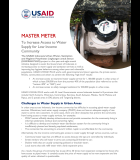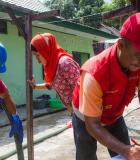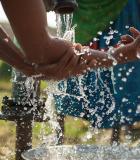Indonesian Forest and Climate Support Project (IFACS)
Indonesia is home to some of the world’s largest tropical rainforests and peatlands. Their stature is such that they are often referred to as the “lungs of the world.” These areas sustain rich biodiversity and are the habitat of many keystone species including the orangutan, the Sumatran tiger, and the clouded leopard, to name a few. Approximately 30 million culturally diverse people live in and around these forests. They are reliant on the forests both for their livelihood and for the ecosystem services they provide. In recent times, extensive deforestation has occurred and uncontrollable forest fires continue to be a problem. Together, these factors have made Indonesia a major emitter of CO2 and therefore a significant contributor to global climate change.
USAID established the Indonesian Forestry and Climate Support (IFACS) to assist the Government of Indonesia (GOI) to reduce the country’s greenhouse gas (GHG) emmissions from forest degradation and loss.
Activity Description
IFACS activities contribute to reduced carbon emissions in Indonesia’s land-use sector by integrating the conservation of forests and peatlands with low-emission development strategies (LEDS). This has been achieved through partnerships with district governments, local communities and non-governmental organizations to promote conservation policies and livelihoods that reduce deforestation and ensure sustainable forest management. The project also works with private sector partners in the forestry, plantation and mining sectors to introduce best management practices to conserve high-conservation value (HCV) forests and integrate LEDS into their business operations.
IFACS activities are designed around two main pillars – environmental governance and improved forest management – and are implemented through four complementary components:
- Land and Forest Resource Governance
- Forest Management and Conservation
- Private Sector, Local Enterprise and Market Linkages
- Project Coordination and Management
Crosscutting activities dedicated to supporting these four components in the various landscapes include: Communication and Outreach; Grants; Training and Capacity Building; and Monitoring and Evaluation.
Expected Outcomes
- Six million tCO2e reduced or sequestered through improved natural resource governance and forest management, leading to reductions in deforestation and degradation of USAID IFACS landscapes (~11 million hectares);
- Three million hectares of natural tropical forest and peatlands, at least 1.7 million of which is priority orangutan habitat, under improved management by the private sector, communities, and government;
- Twelve districts with draft spatial plans incorporating SEA recommendations; and
- Twelve thousand forest-dependent beneficiaries receiving economic benefits from LEDS
Actual Outcomes
- 12,728 people (106% of the target value) are receiving economic benefits from LEDS activities promoted by IFACS in the landscapes
- Over 4.1 million ha of land (138% of the target value) are under improved and sustainable natural resource management
- 269 villages have signed Community Conservation and Livelihood Agreements (CCLA), confirming their commitment to engage in conservation efforts to protect HCV forest areas bordering their villages. This represents 168% of the original target value of 160 CCLAs
- 76 villages have increased capacity to adapt to the impacts of climate variability and change





